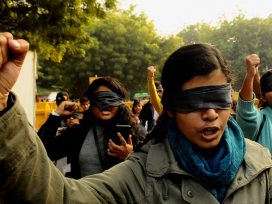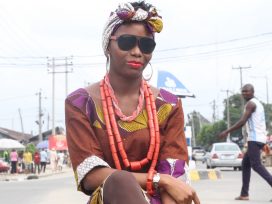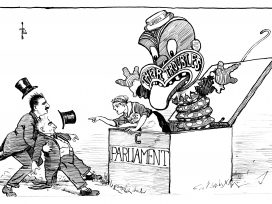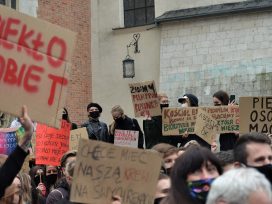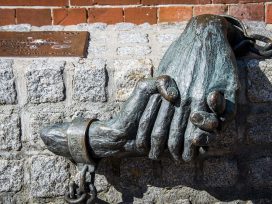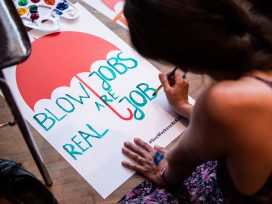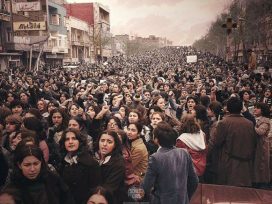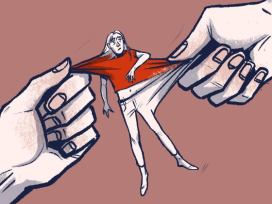One year in and the pandemic has hit women particularly hard: decades’ of advancement in the workplace and academia are under threat; domestic violence has skyrocketed. And yet, in institutional politics, women seem to be growing in numbers and influence. This year’s International Women’s Day ‘challenge’ is one of recovery.
Locked up at home: Kinder, Kirche, Küche
While the handling of the pandemic has been an important test for female leaders, in other respects the past year has been a ‘major challenge for gender equality‘. Domestic confinement, essential to prevent the spreading of contagion, has fuelled a wave of domestic violence that constitutes a much overlooked ‘shadow pandemic’, as the United Nations Women defined it.
In India, domestic violence has taken the biggest toll on migrant women labourers: ‘they are either restricted to undersized urban housing with abusive husbands or suffer sexual attacks while returning to be quarantined in their village homes’, writes Atreyee Sen. With pro-women policies largely unable to reach female workers at the lowest rung of society, small-scale gendered solidarities are often the only shield against lockdown violence.
Who gets a desk and who works by the kitchen table? Whose rules determine how space is used or shared? Whose identity does a room express? The home is the place where power relations are established and contested. Ingrid Ruudi looks at how modern living space has shaped and been shaped by gender roles.
Gendered design
Living spaces and gender relations in Estonian homes
Well beyond white feminism
Secular feminists often find themselves at odds with ‘Islamic feminism’, a relatively recent current of thought aimed at a form of religious exegesis that deconstructs the patriarchal settlement while preserving a form of religious reference. Islamic feminists reveal how the trope of ‘saving Muslim women’ is produced by the colonial nature of power, yet their ‘need to “justify” Islam acts as a brake on their ambitions to reform it’.
Ghaliya Djelloul suggests a way past restrictive dichotomies, proposing a truly de-colonial understanding of Islamic feminism.
Islamic feminism has gained ground in Turkey since the 1990s and under AKP rule as an attempt to create an alternative women rights discourse in which ‘women and men are rendered equally as believers of Islam with complementary human faculties’.
But feminism in Turkey remains multifaceted, with three other lines of argument shaping the current discourse on women’s issues: Kemalism, embodying the ‘state feminism’ of the early republic; second wave feminism, challenging the patriarchal aspects of the Kemalist state; and Kurdish nationalist feminism, raising criticism about the underlying ‘Turkishness’ of all other feminist discourses in the country.
In an effort to reconcile these different lines of thought, Ayşe Durakbaşa restates the potential of feminism as a critical opposition movement to capitalist modernity.
Feminism in Turkey
History and contemporary agenda
Much of the academic discussion on African feminism has been on how to properly define it. Yemisi Akinbobola refuses postcolonial standpoints (which reject feminism as a product of the other) to adopt a pragmatic stance: ‘African feminisms do exist, and their definition should be based on the empirical study of the lived experiences of African women’.
In a country like Nigeria, for instance, with low employment and high poverty rates, the self-help and economic empowerment rhetoric of neoliberal feminism may be the best approach to bring about change, although its intrinsic solipsism does not challenge structural inequalities nor address the cultural status quo.
The violence of sex
How are sexual assault and hegemonic, heteronormative sexual interactions related? What identifies the grey area of ‘unjust sex’ between ethical sexual interactions and outright violence? ‘What distinguishes these cases from each other is the different way in which a woman’s sexual agency is deployed,’ argues Ann J. Cahill. In the grey area, the woman’s contribution matters, but her agency is hijacked and ‘deployed only so that it can be used against her’, as a mere accreditation that provides an ethical cover to unjust sex.
In spite of ‘60s slogans such as ‘make love, not war’, violence and sexuality are deeply intertwined according to Gaby Zipfel: both underlie the vital, affective expressions of gendered bodies, in ways that depend on bodily as well as social and cultural structures.
‘In public consciousness, the notion that violence and sexuality exist in a dynamic relationship is as prevalent as it is unspoken. A conspiracy of silence and obfuscation, of belittling nods and winks with occasional histrionic expressions of horror, is deployed to limit and fend off confusion or threats to the normative social fabric’, Zipfel writes.
Gaby Zipfel was a co-founder of Eurozine who recently passed away. Her vision, intellectual energy and unmatched capacity for critique will be sorely missed.
Marching through the institutions
The patriarchal culture entrenched in Belarusian political life has come to seem archaic to a large section of the country’s population. Combining traditional and feminist values, Tsikhanouskaya, Kalesnikava and Tsapkala have lent this sea-change form and expression.
A feminist revolution?
On the female face of the Belarusian protests
Since the end of 2019, after months of turmoil, Finnish politics has been dominated by young female leaders. The ascending political parabola of Prime Minister Sanna Marin and her fellow coalition leaders is a prime example of the ‘glass cliff’, which makes women more likely to achieve leadership roles in times of crisis, when risks are higher and leaders are prone to become expendable scapegoats.
However, there may be another explanation to the ‘glass cliff’ phenomenon: ‘women are generally viewed as more capable of crisis management – more nurturing and diplomatic than men,’ writes Janne Wass.
Historic losses
The pandemic has caused decades’ worth of gains of female academics to plummet, and this trend continues. Thus it is imperative we take a look at how unusual and innovative research is financed and organized, what renders it so volatile and precarious.
Education under neoliberalism – a contradictory mix of competition and austerity promoting vaulted excellence over grounded learning. Cornelia Klinger highlights awards ceremonies appropriating the names of famous historic achievers as a prime example of capitalist commodification masking old and new sociopolitical inequality and injustice.
Race-Class-Gender
Old axes of inequality and new concerns
The abortion ruling of Poland’s politically servile Constitutional Tribunal was a debt repaid to Law and Justice’s rightwing Catholic constituency after its re-election last year. The reaction has been the biggest wave of demonstrations in the country since 1989 and seems to galvanize women’s political involvement in the country.
Last July, members of the AKP proposed withdrawing Turkey from the Istanbul Convention. With femicides in the country becoming ever more frequent, the prospect of losing one of the few legal protections for vulnerable women has provoked outrage. Eurozine’s Turkish partner journal Varlık commented on the proposals and published an open letter calling on the Turkish government to honour its commitments under the Convention.
When solidarity is all you have
International feminist solidarity in a long-stated goal of women’s movements, and yet, it seems almost impossible to materialize. Can street protests communicate justice for all? Political theorist Nikita Dhawan criticizes global movements where only ‘certain individuals are well positioned to express their aspirations’.
(Im)Possible solidarities
Transnational feminist politics and the erotics of resistance
When crisis hits, vulnerable groups suffer. And sex workers, already enduring precarity, have become the scapegoats of COVID-19’s health focus, facing heavy fines, police abuse and deportation threats. Excluded from regular employment and thus left alone by nation states and welfare systems, they have nothing but each other to rely on. Sex workers have learnt the bitter lessons of the HIV/AIDS pandemic and joined forces early on.
Selling sex in the pandemic
Corona crisis reveals grassroots support
Dowry
Textiles are more than just yarn – they are memory and identity, preserved by a silent art and left from mother to daughter. Migrants pack them in their bags to recreate the homes they have lost. Burcu Sahin explores the timeless language encoded in stitching.
Who’s your mommy? What has she left you with?
Simone de Beauvoir seems impossible to avoid when discussing feminism, even to this day. But denying her is quite rampant. Seventy years after ‘The Second Sex’ was published, Eve Gianoncelli reviews French new conservative authors who set out to forget about Beauvoir, only to be found captured by her most influential legacy.
We’re not Beauvoirians, but...
Conservative intellectuals and Simone de Beauvoir
Should you want more to read, here is our topical on girls’ and women’s political activism:
Published 8 March 2021
Original in English
First published by Eurozine
© Eurozine
PDF/PRINTNewsletter
Subscribe to know what’s worth thinking about.
Related Articles

Women’s rights activists protesting for a democratic Iran counteract armed police on the streets with non-hierarchical leadership, a rhizomatic network, transnationality and flash mobs. Their momentum, supported globally via the Iranian diaspora, also benefits from a legacy of historic feminist action under extreme oppression.

Women forced to leave their homes during war face gender specific dangers. Mobile phones and refugee-targeted apps can be either a lifeline or an unforeseen trap, associated with rape and trafficking. How could the West’s innovative digital response to sexual health and exploitation be improved?
